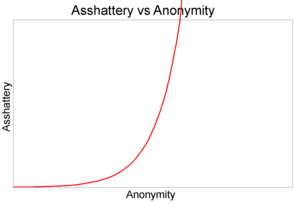Anonymous-Asshattery Paradigm
The Anonymous-Asshattery Paradigm is an Internet theorem that states that as one's level of anonymity goes up, their bias towards asshattery goes up exponentially. It singlehandedly has changed the field of Internet sociology.
Origins[edit | edit source]
First postulated by Internet President Albert Arnold Gore, Jr., the Anonymous-Asshattery Paradigm was designed in the aftermath of the Great AOL War of 2001. While examining the aftermath of the Christian shelling on the Teenage encampments, President Gore began theorizing an explanation for the devastation that lay before him. After eight months of research and consultation with esteemed and dignified minds, President Gore published his now-legendary thesis, entitled "Danger in Societal Problems: The Anonymous-Asshattery Paradigm and the Correction of Future Policies to Prevent Further Destruction and Conflict Amongst Opposing Viewpoints and Ideologies on the Internet."[1]
"Danger in Societal Problems: The Anonymous-Asshattery Paradigm and the Correction of Future Policies to Prevent Further Destruction and Conflict Amongst Opposing Viewpoints and Ideologies on the Internet"[edit | edit source]
The four hundred and fifty three page report, affectionately abbreviated to DiSP:TA-APatCoFPtPFDaCAOVaIotI, was released on March 18, 2002, and explains the different stages of the Paradigm, known as the levels of anonymity-asshattery. These levels ranged from low levels of anonymity on sites that require real names and connections to contribute,[2] to moderate levels of anonymity requiring naught but a screen name and a promise to not be disruptive or detractive,[3] to high levels of anonymity on sites that throw identity to the wind and allow their users to roam free in an orgy of debauchery and furry porn.[4]
Gore explains, in high detail, that one's propensity towards dickery on the Internet is directly proportional to the level of anonymity afforded by the medium. Gore noted two examples from polar opposites on his levels of anonymity-asshattery.
Level 1: Dr. Robert Craig, Resident Oncologist at Brigham and Women's, Boston on nih.gov[edit | edit source]
| “ | Assuming that medical advances continue at their projected pace, the effectiveness of colon cancer treatments will eventually approach a level where oncologists will be able to indefinitely postpone severe symptoms for years or possibly decades; such marvels would possibly extend to fill the dearth of solutions for rectal cancer as well. | ” |
Level 5: Anonymous on 4chan.org[edit | edit source]
| “ | TITS OR GTFO lol i'll stick it in ur pooper loli love anonymous you whore | ” |
Impact[edit | edit source]
The Paradigm has shattered previously conceived notions about the mindset of Internet users. Past hypotheses posed by sociologists assumed either the best or the worst of online users; either users were mostly courteous and saintly but influenced by a small group of bad eggs, or they were universally hellions bound on destroying the transmission of information. The middle ground presented by Gore was unprecedented.
Most Internet sociologists were reluctant to accept Gore's research and his new ideas, partly because of the contradiction to prior theories, and partly because of Gore's lack of prior experience in the field. Napoleon Bonaparte, who had previously presented the Theorem of Perpetual Douchebaggery, was foremost amongst the opposition.
| “ | In all my years of research, study, and conquest, I have never seen such a ridiculous idea as Mr. Gore's. His work in Internet sociology is no more than a scientific invasion. That's my job, not his. | ” |
Some came to Gore's defense, however; Oscar the Grouch, a renowned psychologist, supported the Paradigm, calling it "one of the greatest things developed from modern research ... since the invention of the garbage compactor."
Future[edit | edit source]
No one is certain of the final impact of this theorem; as the Internet evolves, the Paradigm may lose its applicability. Until it is replaced by a newer hypothesis, it stands as the prime amongst Internet relations theories.
Footnotes[edit | edit source]
- ↑ In a tragic yet ironic twist, the length of the printed title, when combined with the popularity of the study, led to the destruction of a portion of the Amazon rainforest that President Gore had previously declared "preserved." The rainforest was not available for comment.
- ↑ See: *.gov, *.edu, *.xxx.
- ↑ See: GameFAQs, Wikipedia, Digg.
- ↑ See: 4chan, Teens4Christ, Uncyclopedia.


